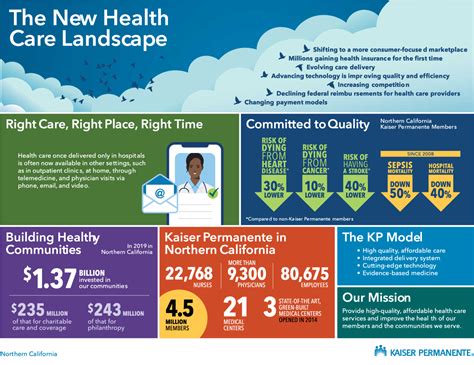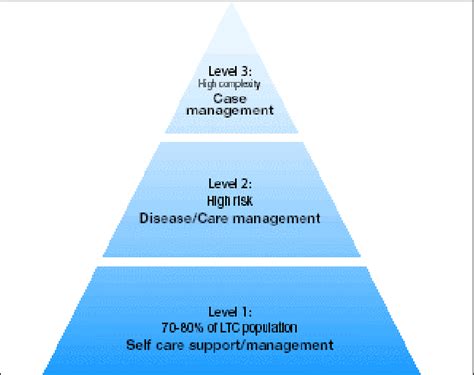Kaiser Permanente is one of the largest and most well-known healthcare organizations in the United States, providing high-quality medical care to millions of people across the country. With a rich history dating back to the 1940s, Kaiser Permanente has established itself as a leader in the healthcare industry, offering a unique approach to medical care that emphasizes prevention, education, and patient-centered care. In this article, we will delve into the world of Kaiser Permanente medical care, exploring its benefits, working mechanisms, and what sets it apart from other healthcare providers.
The importance of having access to quality medical care cannot be overstated. With the rising costs of healthcare and the increasing complexity of medical treatments, it is essential to have a reliable and trustworthy healthcare provider that can offer comprehensive and coordinated care. Kaiser Permanente has been at the forefront of this effort, providing its members with a wide range of medical services, from routine check-ups and preventive care to specialized treatments and chronic disease management. By focusing on the whole person, not just the illness, Kaiser Permanente has been able to improve health outcomes, reduce costs, and enhance the overall patient experience.
Kaiser Permanente's approach to medical care is built around the concept of integrated care, which means that all aspects of a patient's care are coordinated and managed by a single organization. This approach allows for seamless communication and collaboration between healthcare providers, ensuring that patients receive the right care at the right time. With a network of skilled physicians, nurses, and other healthcare professionals, Kaiser Permanente is able to provide its members with access to a wide range of medical specialties, including primary care, specialty care, and hospital care. Whether it's managing a chronic condition, treating an acute illness, or providing preventive care, Kaiser Permanente's integrated care model is designed to meet the unique needs of each patient.
Kaiser Permanente Medical Care Benefits

The benefits of Kaiser Permanente medical care are numerous and well-documented. By providing comprehensive and coordinated care, Kaiser Permanente is able to improve health outcomes, reduce costs, and enhance the overall patient experience. Some of the key benefits of Kaiser Permanente medical care include:
* Improved health outcomes: Kaiser Permanente's focus on preventive care and chronic disease management has been shown to improve health outcomes and reduce the risk of complications.
* Reduced costs: By providing coordinated care and reducing unnecessary tests and procedures, Kaiser Permanente is able to reduce healthcare costs and improve efficiency.
* Enhanced patient experience: Kaiser Permanente's patient-centered approach to care emphasizes communication, education, and empowerment, leading to higher patient satisfaction and engagement.
* Increased accessibility: With a network of medical facilities and healthcare providers, Kaiser Permanente is able to provide its members with convenient and accessible care.
Kaiser Permanente Working Mechanisms

So, how does Kaiser Permanente's medical care work? The organization's working mechanisms are built around the concept of integrated care, which means that all aspects of a patient's care are coordinated and managed by a single organization. Here are the key steps involved in Kaiser Permanente's working mechanisms:
1. **Membership**: To access Kaiser Permanente's medical care, individuals must first become members of the organization. This can be done through an employer-sponsored plan, an individual or family plan, or a Medicare or Medicaid plan.
2. **Primary Care**: Once a member, patients are assigned to a primary care physician who serves as their main point of contact for medical care. Primary care physicians provide routine check-ups, preventive care, and referrals to specialty care.
3. **Specialty Care**: If a patient requires specialized care, their primary care physician will refer them to a specialist within the Kaiser Permanente network. Specialty care services include cardiology, oncology, orthopedics, and more.
4. **Hospital Care**: In the event of a hospitalization, Kaiser Permanente's hospital care teams provide comprehensive and coordinated care, working closely with primary care physicians and specialists to ensure seamless transitions and optimal outcomes.
Kaiser Permanente Medical Specialties
Kaiser Permanente offers a wide range of medical specialties to meet the diverse needs of its members. Some of the medical specialties available through Kaiser Permanente include:
* **Cardiology**: Kaiser Permanente's cardiology team provides comprehensive care for heart-related conditions, including coronary artery disease, heart failure, and arrhythmias.
* **Oncology**: The organization's oncology team offers advanced cancer treatment options, including chemotherapy, radiation therapy, and surgery.
* **Orthopedics**: Kaiser Permanente's orthopedic team provides care for musculoskeletal conditions, including joint replacements, fractures, and sports injuries.
* **Neurology**: The organization's neurology team diagnoses and treats conditions affecting the brain, spine, and nervous system, including stroke, epilepsy, and multiple sclerosis.
Kaiser Permanente Preventive Care
Preventive care is a critical component of Kaiser Permanente's medical care approach. By focusing on prevention and early detection, the organization is able to reduce the risk of chronic diseases and improve health outcomes. Some of the preventive care services offered by Kaiser Permanente include:
* **Routine Check-Ups**: Regular health check-ups help identify potential health issues early, allowing for prompt intervention and treatment.
* **Screenings**: Kaiser Permanente offers a range of screenings, including mammograms, colonoscopies, and blood pressure checks, to detect health problems early.
* **Vaccinations**: The organization provides vaccinations to protect against infectious diseases, such as flu, pneumonia, and HPV.
* **Health Education**: Kaiser Permanente's health education programs empower patients to take control of their health, providing information and resources on healthy eating, exercise, and stress management.
Kaiser Permanente Chronic Disease Management

Chronic disease management is another key aspect of Kaiser Permanente's medical care approach. By providing comprehensive and coordinated care, the organization is able to help patients manage chronic conditions, such as diabetes, hypertension, and asthma. Some of the chronic disease management services offered by Kaiser Permanente include:
* **Disease Monitoring**: Regular monitoring of chronic conditions helps identify potential complications early, allowing for prompt intervention and treatment.
* **Medication Management**: Kaiser Permanente's pharmacists and healthcare providers work together to manage medications, ensuring that patients receive the right medications at the right time.
* **Lifestyle Modifications**: The organization's health education programs provide patients with the information and resources they need to make lifestyle modifications, such as healthy eating and exercise, to manage chronic conditions.
* **Care Coordination**: Kaiser Permanente's care coordination teams work with patients, families, and healthcare providers to ensure seamless transitions and optimal outcomes.
Kaiser Permanente Patient-Centered Care

Patient-centered care is at the heart of Kaiser Permanente's medical care approach. By focusing on the unique needs and preferences of each patient, the organization is able to provide personalized care that is tailored to the individual. Some of the patient-centered care services offered by Kaiser Permanente include:
* **Personalized Care Plans**: Kaiser Permanente's healthcare providers work with patients to develop personalized care plans that take into account their unique needs and preferences.
* **Patient Education**: The organization's patient education programs empower patients to take control of their health, providing information and resources on healthy eating, exercise, and stress management.
* **Care Coordination**: Kaiser Permanente's care coordination teams work with patients, families, and healthcare providers to ensure seamless transitions and optimal outcomes.
* **Patient Engagement**: The organization's patient engagement initiatives encourage patients to take an active role in their care, providing opportunities for feedback, education, and empowerment.
Kaiser Permanente Technology and Innovation

Kaiser Permanente is at the forefront of healthcare technology and innovation, leveraging digital tools and platforms to enhance the patient experience and improve health outcomes. Some of the technology and innovation initiatives offered by Kaiser Permanente include:
* **Telehealth**: The organization's telehealth services allow patients to access care remotely, using video conferencing and other digital tools to connect with healthcare providers.
* **Electronic Health Records**: Kaiser Permanente's electronic health records system provides patients with secure and convenient access to their medical information, allowing them to take a more active role in their care.
* **Mobile Apps**: The organization's mobile apps provide patients with on-the-go access to their medical information, allowing them to track their health, communicate with healthcare providers, and access care services.
* **Artificial Intelligence**: Kaiser Permanente is exploring the use of artificial intelligence to enhance the patient experience, improve health outcomes, and reduce costs.
Kaiser Permanente Research and Education

Kaiser Permanente is committed to advancing the field of healthcare through research and education. The organization's research initiatives focus on improving health outcomes, reducing costs, and enhancing the patient experience. Some of the research and education initiatives offered by Kaiser Permanente include:
* **Clinical Trials**: The organization's clinical trials program allows patients to access new and innovative treatments, while also contributing to the advancement of medical knowledge.
* **Residency Programs**: Kaiser Permanente's residency programs provide training and education for the next generation of healthcare providers, helping to ensure that patients receive high-quality care.
* **Continuing Education**: The organization's continuing education programs provide healthcare providers with the latest information and skills, helping to ensure that patients receive evidence-based care.
* **Health Policy Research**: Kaiser Permanente's health policy research initiatives focus on improving healthcare policy and practice, helping to ensure that patients receive high-quality, affordable care.
As we conclude our exploration of Kaiser Permanente medical care, we invite you to share your thoughts and experiences with us. Have you had a positive experience with Kaiser Permanente's medical care? Do you have questions or concerns about the organization's approach to healthcare? We encourage you to comment below, share this article with others, and join the conversation about the future of healthcare.
What is Kaiser Permanente's approach to medical care?
+
Kaiser Permanente's approach to medical care is built around the concept of integrated care, which means that all aspects of a patient's care are coordinated and managed by a single organization.
What are the benefits of Kaiser Permanente's medical care?
+
The benefits of Kaiser Permanente's medical care include improved health outcomes, reduced costs, and enhanced patient experience.
How does Kaiser Permanente's working mechanism work?
+
Kaiser Permanente's working mechanism involves a network of skilled physicians, nurses, and other healthcare professionals who work together to provide comprehensive and coordinated care to patients.








